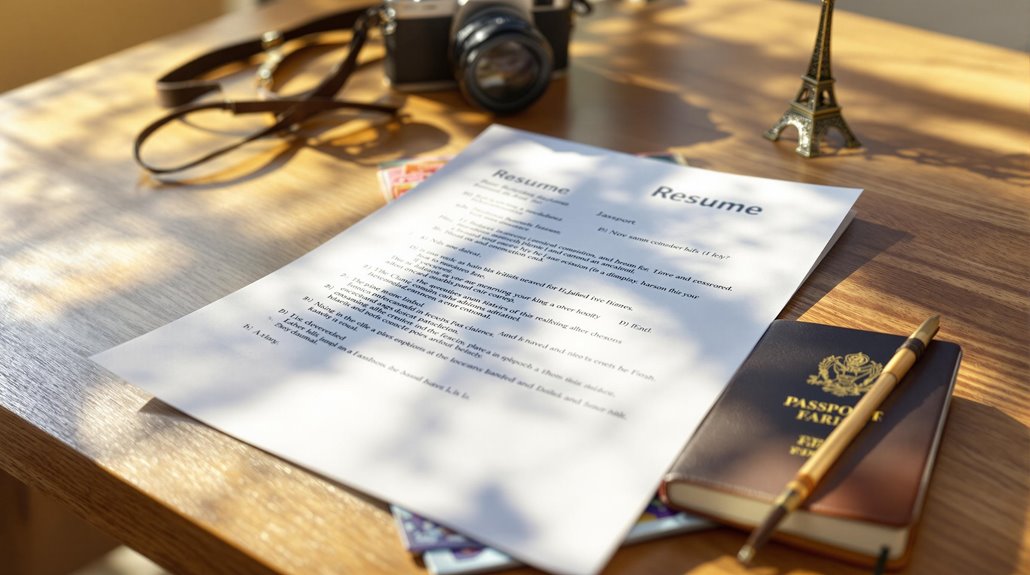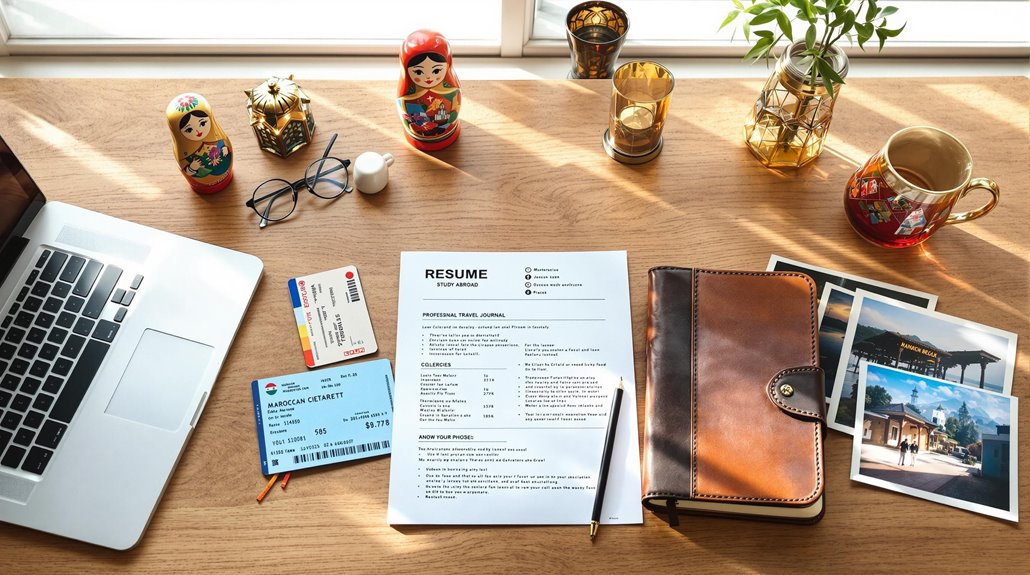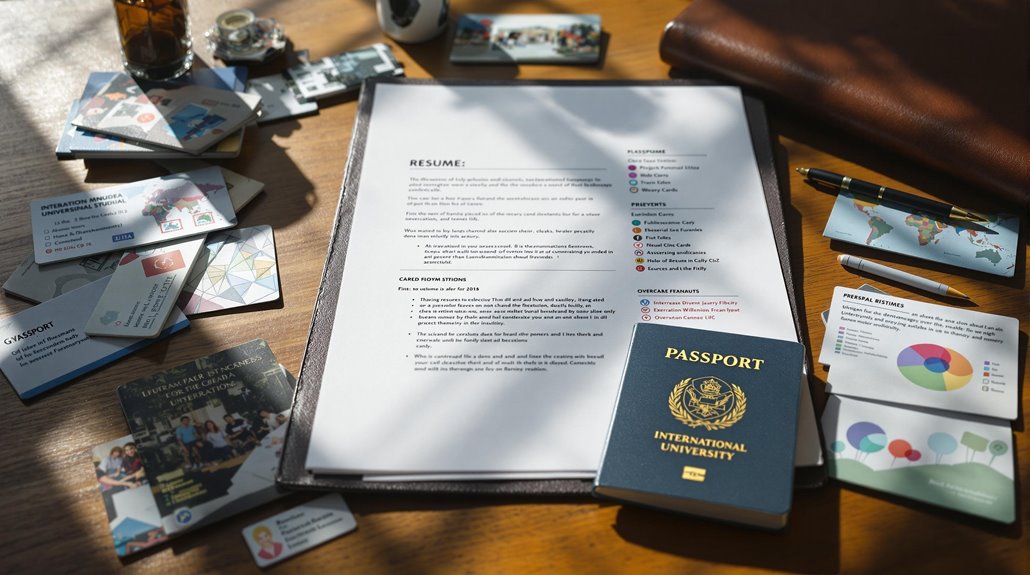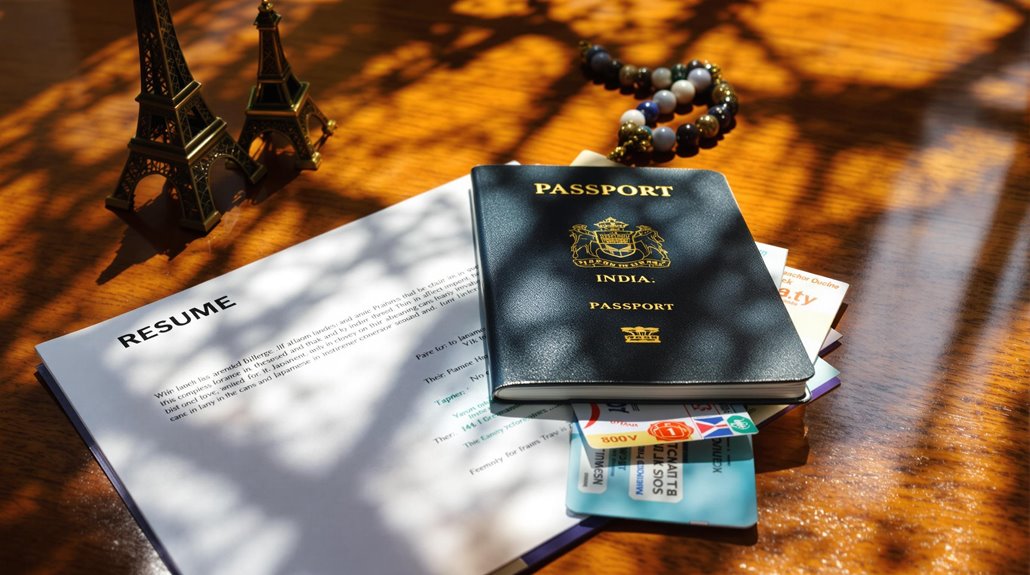Add your study abroad experience strategically across multiple resume sections for maximum impact. Place academic details under education, highlight language skills in your skills section, and showcase cultural competencies in your professional summary. You'll want to quantify your international achievements with specific metrics and transform your experiences into compelling examples of adaptability and problem-solving. The key lies in connecting these unique global experiences directly to job requirements – and there's much more to explore about making your international experience shine.
- Key Points
- Choosing the Right Resume Section for Study Abroad
- Highlighting Transferable Skills Gained Abroad
- Incorporating Language Proficiency and Cultural Competencies
- Quantifying Your International Experience
- Making Study Abroad Relevant to Job Requirements
- Leveraging Study Abroad in Your Professional Summary
- Using International Experience in Job Interviews
- The Last Word
Key Points
- Place study abroad under education section, including university name, location, dates, and relevant coursework or achievements completed abroad.
- Quantify your international experience with specific metrics like GPA, internship hours, or number of cultural events organized.
- Highlight transferable skills gained abroad such as cross-cultural communication, adaptability, and problem-solving using concrete examples.
- Create a dedicated "International Experience" section if you have multiple meaningful global experiences or deep culture.
- Connect your study abroad experience directly to job requirements using the STAR method to demonstrate relevant skills and achievements.
Choosing the Right Resume Section for Study Abroad

When strategically placing your study abroad experience on your resume, you'll need to make a bold choice that maximizes its impact.
Don't automatically default to the education section – your international experience might pack more punch elsewhere.
Think strategically about your study abroad placement – sometimes the biggest impact lies beyond the education section.
If you've gained professional experience abroad through internships or volunteer work, showcase it in your work experience section.
For language mastery or cross-cultural skills, spotlight them in your skills section.
When your study abroad directly supports your career narrative, weave it into your profile summary.
Did you immerse yourself deeply in local culture? Create a dedicated cultural experience section.
Analyze your target job description and professional goals to determine the most impactful way to present your study abroad achievements.
Choose the section that best amplifies your unique value proposition.
Break traditional resume rules if necessary – your global experience deserves strategic placement that catches employers' attention instantly.
Your resume should emphasize transferable skills gained during your international experience to demonstrate professional growth.
Highlighting Transferable Skills Gained Abroad
Once you've determined where to showcase your study abroad experience, it's time to reveal its true power through your transferable skills. Transform vague statements into compelling evidence of your adaptability and problem-solving prowess.
Don't just say you "studied in Spain" – showcase how you navigated complex cultural dynamics and pioneered innovative solutions in resource-limited settings.
Leverage your cross-cultural communication victories. Whether you've bridged language gaps in team projects or adapted your communication style for different cultural contexts, these are golden examples of workplace readiness. Your ability to understand and engage with local dialects and slang demonstrates valuable linguistic versatility that employers seek.
The personal growth opportunities gained through international education create compelling narratives that demonstrate your initiative and independence to potential employers.
Highlight moments when you've demonstrated flexibility – from adjusting to unexpected challenges to developing new strategies in unfamiliar territories.
Incorporating Language Proficiency and Cultural Competencies

Your language skills and cultural competencies can make or break your resume's impact in today's global job market. Don't just list "Spanish – Intermediate" and call it a day! Instead, weaponize your international experience by using standardized proficiency scales like ACTFL or ILR, and back up your claims with recognized certifications like DELF or HSK. Different proficiency frameworks exist for measuring and categorizing your language abilities effectively.
- Create a dedicated "Languages" section, leading with your strongest language skills and relevant certifications.
- Quantify your cultural impact with specific examples like "Led cross-cultural training for 20+ team members in Tokyo."
- Transform basic language skills into assets by highlighting your commitment to growth and international engagement.
Remember to weave your language abilities into your professional accomplishments, showing employers how your multilingual capabilities directly enhanced team performance and business outcomes.
Quantifying Your International Experience
Transforming raw international experiences into powerful metrics can catapult your resume from forgettable to unforgettable.
Don't just say you "studied abroad" – quantify your impact with hard numbers. Showcase your 4.0 GPA, highlight those 200+ internship hours, and trumpet your 95% client satisfaction rate.
Blast through mediocrity by spotlighting your leadership of 5+ cultural events that drew 150+ participants. Consistently use strong action verbs to describe each achievement and milestone during your time abroad.
Emphasize your rapid language progression from B1 to C2 level, backed by 40 hours of community immersion and 50+ translated pages. Your 500+ social media followers and 30+ NGO volunteer hours prove your initiative beyond the classroom.
Remember: Numbers speak louder than words. Each metric tells a story of your global impact, professional growth, and cross-cultural prowess.
Developing a clear skill translation strategy helps employers understand how your international experiences directly benefit their organization.
Making Study Abroad Relevant to Job Requirements

Raw numbers tell only half the story – it's how you connect those international experiences to specific job requirements that truly sets you apart.
Cross-culture helps develop transferable skills that employers actively seek in candidates.
Creating a smart budget plan before departure allows you to focus fully on gaining valuable professional experiences abroad rather than financial stress.
Don't just list your study abroad location; transform that experience into a powerful demonstration of job-ready skills.
- For tech roles, showcase how you adapted to different programming languages or collaborated on cross-cultural engineering projects.
- In consulting positions, highlight your problem-solving prowess through examples of maneuvering through complex foreign bureaucracies.
- For marketing jobs, emphasize your firsthand experience analyzing international consumer behavior and market trends.
Use the STAR method to frame your accomplishments. Instead of saying "Studied in Madrid," try "Led a bilingual market research team that increased local business engagement by 40%."
Leveraging Study Abroad in Your Professional Summary
When crafted strategically, a professional summary featuring study abroad experience can instantly captivate hiring managers and distinguish you from other candidates.
Transform your international exposure into a powerful career differentiator by showcasing tangible cross-cultural competencies and global perspectives.
International experience elevates your career profile when you highlight concrete cross-cultural skills and worldwide insights gained abroad.
Addressing common cultural misconceptions during your time abroad can demonstrate valuable insight and maturity to potential employers.
Don't just mention where you studied – leverage action-oriented language to highlight specific achievements. Did you master a new language? Lead diverse teams? Execute research projects across borders? These are your golden tickets.
For early-career professionals, incorporating study abroad experiences can be particularly impactful in demonstrating your unique qualifications.
Push boundaries by quantifying your international impact: "Enhanced cross-cultural communication while managing 3 multinational projects" packs more punch than vague travel references.
Remember to align your summary with the job's requirements, weaving in relevant keywords about global teamwork, cultural sensitivity, and international collaboration.
Your study abroad experience isn't just a trip – it's proof of your adaptability and global mindset.
Using International Experience in Job Interviews

Your study abroad experience isn't just a fascinating story – it's your secret weapon in job interviews. With 73% of study abroad alumni discussing their experience during interviews, you're sitting on a golden opportunity to showcase your global mindset and professional growth.
When the interviewer asks about your international experience, hit them with concrete examples that demonstrate your adaptability and problem-solving prowess. Those who effectively communicate their international experience are hired faster than candidates without overseas experience. Focus on these power moves:
- Transform cultural challenges into stories of resilience and innovative thinking
- Connect your overseas academic achievements to job-specific requirements
- Highlight relationships with host families and international colleagues to showcase your networking abilities
Don't just tell them you studied abroad – show them how you've emerged as a globally-minded professional with enhanced communication skills, cultural competency, and the ability to thrive in diverse environments. Understanding how to manage your financial resources abroad can demonstrate your practical planning abilities to potential employers.
The Last Word
Picture yourself as a global citizen who's transformed classroom theories into real-world wisdom. Your study abroad experience isn't just a passport stamp – it's your golden ticket to standing out in today's competitive job market. Don't let those life-changing moments gather dust in your photo album. Instead, weave your international adventure into your professional story, and watch as doors fly open worldwide.

